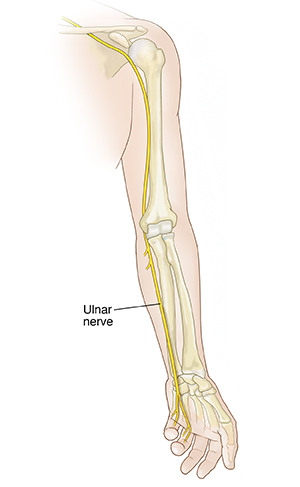Ulnar Nerve Palsy
The ulnar nerve travels down the arm from the shoulder to the hand. It controls movement and feeling in the wrist and hand. Damage to this nerve can cause a condition called ulnar nerve palsy.
A common cause of ulnar nerve palsy is leaning on the elbow for long periods of time. Injury to the arm or elbow, such as a fracture, can also damage the ulnar nerve.
Symptoms of ulnar nerve palsy include:
-
Numbness, tingling, or burning (often described as pins and needles)
-
Pain
-
Weakness or muscle shrinking in the hand and fingers
The treatment depends on the cause of the nerve damage. In some cases, the problem will go away on its own once pressure to the nerve is relieved. Certain tests may be done to help determine the injury and extent of damage. These include nerve conduction studies (NCS) and electromyography (EMG). Splinting the wrist or elbow to limit movement may help with healing. If the problem is due to trauma or injury, physical therapy may be prescribed. Corticosteroid injections into the area may reduce swelling and pressure on the nerve. Surgery to repair the nerve may be needed for chronic symptoms that don't respond to simpler treatments.

Home care
-
Rest the wrist and arm until normal feeling and strength return.
-
If you were given a splint or sling, wear it as directed.
-
Don't lean on your elbows.
-
Consider wearing elbow pads to protect the nerve
-
If medicines were prescribed for pain or nerve sensations, take them as directed.
Follow-up care
Follow up with your healthcare provider or as advised by our staff.
When to get medical advice
Call your healthcare provider right away if you have any of the following:
Call 911
Call 911 if any of these occur:
-
Symptoms spread to other parts of the body
-
Slurred speech, confusion
-
Trouble speaking, walking, or seeing
Online Medical Reviewer:
Joseph Campellone MD
Online Medical Reviewer:
Marianne Fraser MSN RN
Online Medical Reviewer:
Raymond Kent Turley BSN MSN RN
Date Last Reviewed:
1/1/2022
© 2000-2024 The StayWell Company, LLC. All rights reserved. This information is not intended as a substitute for professional medical care. Always follow your healthcare professional's instructions.